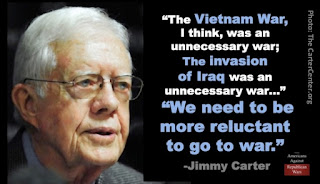Abraham Lincoln became
sixteenth president as an agent of peace, but he confronted a nation separated
south from north. "One of them would make war rather than let the nation
survive,” concluded Lincoln, “and the other would accept war rather than let it
perish” (Abraham Lincoln, 2nd Inaugural Address, 4 March 1865). Thus, the war came!
That war crippled America,
scarring its national body for generations to come. It resulted in 418,206 killed
and another 362,130 citizens wounded. Half a century later, American politics
had become so corrupted that adding pre-emptive strikes to our diplomatic
arsenal only transformed American soldiers into foreign invaders.
War is expensive! By any
measure, it is excessive, even wasteful! Iraq cost more than 4,400 American
deaths. Thousands more were wounded. The 2007 surge added 30,000 additional troops
to Iraqi collateral damages--70-76,000 killed (Washington Post, 8-21-07), He paid for it by putting it on our national credit card.
When unveiling America’s
new military-industrial phenomenon in 1961, President Eisenhower cautioned us
regarding grave implications of the “immense military establishment and a large
arms industry.” Ike accepted it, but agreed it was “new in the American
experience, a total influence – economic, political, even spiritual.”
(Emphasis added).
He cautioned us to “guard
against the acquisition of unwarranted influence . . . sought or
unsought, by the military-industrial complex” (emphasis added). He admitted the
potentially disastrous rise of misplaced power, and rightfully feared it. He
further insisted we must never let this endanger our liberties or democratic
processes (emphasis added).
From the first, America’s
founders gave civilian controls precedence over military powers. Eisenhower
warned, take nothing for granted; “only an alert and knowledgeable citizenry
can compel the proper meshing of the huge industrial and military machinery of
defense with our peaceful methods and goals, so that security and liberty may
prosper together. . .” (2 Eisenhower's “Farewell Address to the Nation,” January 17, 1961).
Decades later, diplomatic efforts stumble in
darkened corridors of the War Department while Congress marches meekly to the
economic ambivalence of the Pentagon. Arms manufacturers “lobby” hard for jobs
in the “growth industry” that now includes an unseen army of unaccountable
para-military sub-contractors earning prime profit from weapons of destruction.
Should journalists dare to
define the philosophical struggles between diplomacy and defense, few would
dare to march by the peacemaker’s drumbeat (Stephen Glain, State Vs Defense.
New York: Crown Publishers, 2011).
The teachings of Jesus no
longer offer relevance to our national debate; therefore Christians ought to
withdraw quietly from public dialogue, privatize personal faith, and allow
diplomacy to wear its military uniform.
If it is true that the
Christian message of the cross no longer has relevance, let us delete John
Wesley from the Internet of human history. Wesley defined himself homo unius
libri--“a man of one book.” He proclaimed that book “the sum of all
religion,” which he asserted “is laid down in eight particulars, and he
described the Sermon on the Mount as an aggregate total of the New Testament
message” (The Works of John Wesley, Vol. V, p. 251).
Jesus challenged humanity
to forgive as God forgives (Mt. 6:12, 14; 18:32; Eph. 4:32; Col. 3:13. Jesus
used the cross to interpret God’s indiscriminate love (
Mt. 5:43-48; Luke 6:32-36). Christian discipleship challenges
us to integrate personal beliefs and behaviors with actions and attitudes,
which Pastor James Leslie Sparks calls “transformation.” Jesus intended for
people to negotiate win-win solutions for everyone and eliminate the win-lose
system of human relationships.
“Love does not delight in evil but rejoices with the truth,” concluded
Saint Paul. “It always protects, always trusts, always hopes, always perseveres
... And now these three remain: faith, hope and love. But the greatest of these
is love ( I Corinthians 13:8, 13,
NIV).
Martin Luther King led the
Civil Rights Movement by challenging followers to “meet the forces of hate with
the power of [Christ-like] love.” Addressing “white brothers all over the
South,” King declared, “we will match your capacity to inflict suffering with
our capacity to endure suffering … Bomb our homes and we will still love you
... We will so appeal to your heart and conscience that we will win you in the
process (Marshall Frady, Martin Luther King, Jr.
New York: Penguin Putnam, Inc., 2002, p. 5).
During the Cold War, members of one local congregation began
worshipping above a former missile silo. Seeing potential opportunity, they
built their new facility on top the Titan II ICBM site. Solid with concrete,
the once destructive missile site became a new symbol of hope for converting
swords and missiles into plowshares and worship into peacemaking.
 Pastor, Stewart Elson,
called it a fitting closure to Cold War and described it as “hope for a world
falling prey to its own worst self”. He thought ending the Cold War and
dismantling the nuclear defense system a superpower exercise of control,
forever hampered by human frailties and political gaming.
Pastor, Stewart Elson,
called it a fitting closure to Cold War and described it as “hope for a world
falling prey to its own worst self”. He thought ending the Cold War and
dismantling the nuclear defense system a superpower exercise of control,
forever hampered by human frailties and political gaming.
Author John Bernbaum called
Jesus the consummate peacemaker. He believed the Church of Jesus Christ, by
virtue of its multinational character, “should by definition be an agent for
world peace!” (John A. Bernbaum, Perspectives on Peacemaking. Glendale,
CA: Regal Books, 1984, p. 254).
Whereas Old Testament
Scripture begins with humanity created in the image of God, New Testament
Scripture reveals Jesus inviting all humanity to further experience the love of
God, and ultimately to share God’s gift of reconciliation and indwelling peace
(I John 1:5-7; 3:1-3,
et al).
From Warner’s World,
this
is walkingwithwarner,blogspot.com – wondering:
agent of peace? agent of war?
Which are you?








